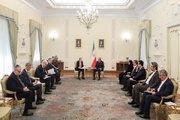The compensation bill comes after a test case won by Mellat Bank, which was banned from operating in Britain or Europe because Britain’s Treasury officials thought it was linked to Iran’s nuclear program.
The Treasury’s case collapsed earlier this summer after the Supreme Court backed the bank’s claim that the blacklisting was done on flawed evidence.
Later this month, the court is expected to order the Treasury to pay Mellat’s legal costs and to begin discussions over damages.
The bank, which used to do around £250 million worth of business a year in Britain, is claiming for both the loss of earnings and damage to its reputation.
The case has paved for the way for similar actions from scores of other Iranian firms, including banks and oil companies, which lawyers say could push the total compensation bill to the £1 billion mark or beyond.
“The Mellat Bank was very profitable and it had to close down its entire operation in both Britain and Europe,” said Sarosh Zaiwalla, a senior partner at the bank’s law firm, Zaiwalla & Co Solicitors.
Mellat Bank also won a case earlier this year in the European courts against a separate blacklisting in the European Union, which imposed its own sanctions on the British Treasury’s recommendation.
The Luxembourg-based European General Court, which adjudicates on EU business law, said the EU had failed to provide enough evidence that the bank was linked to Iran’s nuclear program.
“The Mellat Bank case clearly shows that even in the world of sanctions, the rule of law still applies,” Zaiwalla said. “Regardless of international politics, Europe says there must be a reason to curtail the rights of an entity or individual.”
Zaiwalla added, “Because many of those cases came from British and French government referrals, the European Council may seek to make Britain and France shoulder the bulk of those costs. In some of these other cases, the sanctions may well prove to be justified, but the total bill for the British taxpayer, including that for Mellat Bank, could well be £1 billion.”
Mellat Bank, Iran’s largest private bank, first came under sanctions in late 2009 after senior British Treasury civil servants said the bank had two Iranian clients who were linked directly to the Islamic Republic’s nuclear program.
However, the bank claimed that it had done everything it could to sever any links with the nuclear program.
They also complained that they had not been given a chance to challenge the blacklisting decision beforehand and that it was unfair that the Treasury was citing secret evidence which they were not allowed to see.
In a hearing earlier this summer, the Supreme Court ruled that the British government had acted “irrationally and disproportionately”. It also examined the secret evidence and ruled that it was not “relevant” to the case.
The British government’s sanctions on Mellat Bank prevented the whole of the country’s financial sector from having any business relationship with the bank.
The Supreme Court, however, ruled that it was unfair to single out Mellat and not other Iranian banks.
The precise amount of compensation paid to Mellat Bank by the British government will be settled at a hearing later this year, and will be subject to arbitration.
It is understood that while the bank may not get its full £500 million, it may settle for around £350 million.
However, Iranian companies and individuals have nearly 50 similar cases outstanding in the British and European courts.
MG/HG
MNA
END























Your Comment